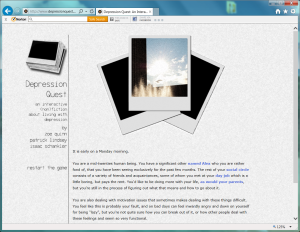
Depression quest – depressingly bad. Condescending to people with mental health problems but has escaped scrutiny due to its author’s PC credentials.
The Witchfinder reviews a truly appalling game called Depression Quest (DQ), written by Zoe Quinn from the #Gamergate controversy. DQ combines condescension with poor execution. Bizarrely, the supposedly ‘right on’ media has actually given this game a pass due to the author’s alleged PC credentials.
The Witchfinder says it is time game journalists stop defending Zoe Quinn and promoting her work – not for gender reasons but because of her comments on mental health issues.
For those of you new to this blog, the author is a law student. Your Inquisitor spends a lot of time helping vulnerable people and their families in Court, pro-bono, as a McKenzie Friend with a specialism in Mental Capacity (the Court of Protection). Since starting this blog some years ago, the Witchfinder has actually passed some exams and now holds a Graduate Diploma in Law. He has moved on to studying a Master’s Degree in Law combined with an LPC (British equivalent of a US attorney’s certificate).
This blog is mostly about politics, with law and the very occasional game review.
One of the first things you need to know about UK Equality Law, which is mostly codified in the Equality Act 2010, is that having the same characteristics does not get you off the hook (s24). So for example, a female boss who fires a worker for getting pregnant is not off the hook for being female. Similarly, having the same disability does not get you off the hook for discrimination. Actionable discrimination need also not be deliberate it could be by accident or even subconscious – see Swiggs and Others v. Nagarajan [1999] UKHL 36.
DQ will be reviewed in accordance with Inquisition Game Review Guidelines, ranked in the four categories of – Graphics, Sound, Gameplay and Ease of Use / Glitches. Finally there is a +/- 10 adjustment category for overall impression.
Graphics – 8 / 25
DQ is an interactive text driven story game in which the player is presented with a passage of text in which a few words are highlighted as mechanisms to provide more information or to progress the story. The modern term for it is Twine – basically it is a slightly more baroque version of ‘choose-your-own-adventure’. Games using similar mechanics are ‘Weird City Interloper’, ‘Progression‘ and ‘Beneath Floes‘. For budding game developers, the Twine engine is here.
Twine-like text games are never going to get top marks for graphics, but the Witchfinder considers that DQ is still a poor example of the genre. DQ has bog standard, grey, by the-numbers-backgrounds and three polaroids at the top of the screen. The three other comparison games mentioned have more memorable graphics. Weird City Interloper, for example, has tentacles. Progression does minimalism, well, minimally, whereas Beneath Floes has eye-catching art.
Your author considers that a pure text game could only ever get 6, and a text game mixed with spectacular still artwork could only ever get 10. DQ has functional mechanics, so avoids the 0-5 zone. It has some grainy, re-used pictures so slightly better than pure text, and the images are overlaid with static as your character gets ‘more depressed’ so gets an 8.
Sound – 11 / 25
The game’s audio is a truly grim piano track. On the other hand, it does evoke the ‘depression vibe’ the game is trying to express. The soundtrack gets glitchier as your character gets ‘more depressed’ but this is apparently deliberate. There are no obvious bugs. The game’s sound gets an 11. On the one hand, a single crappy track. On the other hand, relevant to the context with context specific audio adjustment.
Gameplay – 6 / 25
The real problem with Depression Quest is the gameplay and the dangerous ignorance it demonstrates. What we have here is a clumsily caricatured depiction of depression. Depression and anxiety are the most common mental disorders and roughly 1 in 6 people will experience depression in their lifetime.
Depression is as varied as the 16.6% of the population likely to experience it. What we get in this game is a clumsy, Hammer Horror interpretation – the soundtrack (sad piano) is a case in point.
It is true that a person cannot just ‘snap out’ of depression – saying ‘get over it’ can be unfair. Having said that, research shows that getting enough sleep and exercise can have a profoundly beneficial effect. The British National Health Service website advises –
Do some exercise
Even moderate exercise releases chemicals in your brain that lift your mood. It can help you sleep better, have more energy and keep your heart healthy. If you’re trying to reach a healthy weight, exercise will help you lose the pounds.
Choose an exercise that you enjoy. If it helps, do it with a friend or listen to music. Adults should aim for 150 minutes a week.
Get enough sleep
Around seven to eight hours is the average amount of sleep an adult needs for their body and mind to fully rest, but this can vary. Some people need less and some need more before they feel ready for the day.
Whatever the case, make sure that you make sleep a priority. Some people, such as new parents and shift workers, can find this very hard. Ask your partner or a family member to help you so you can catch up on your sleep.
In a game that is supposed to educate you one would expect this to be pointed out. In DQ? No. Very near the start of the game, you are presented with a choice of trying to stay up late to work on a personal project, or turning in –
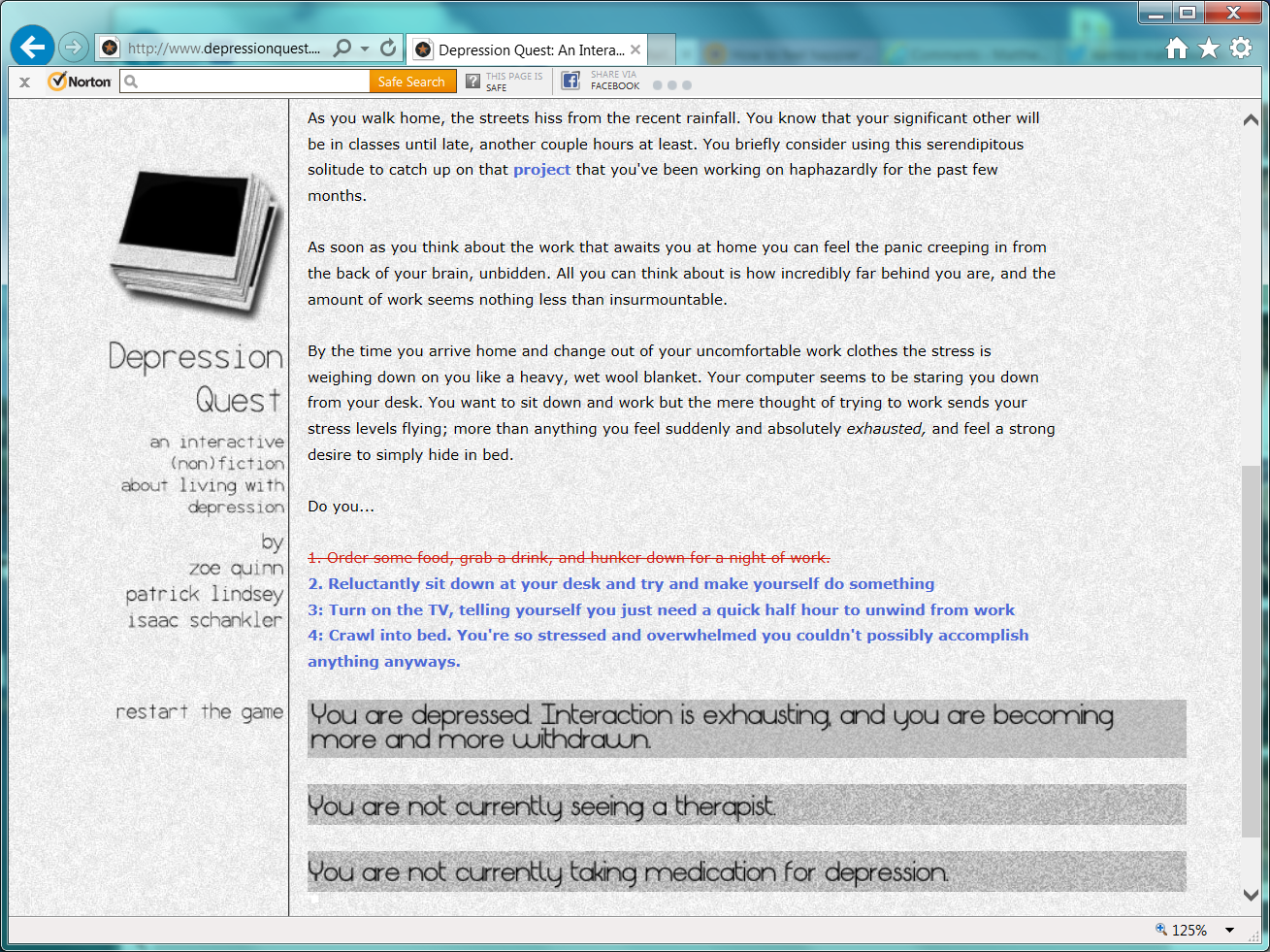
Going to bed early helps depression. See the British National Health Service website linked above. So does ‘Depression Quest’ share this important information …
Nope. Looks like ‘turning in’ just made you more depressed. At best this is ignorance and a missed opportunity –
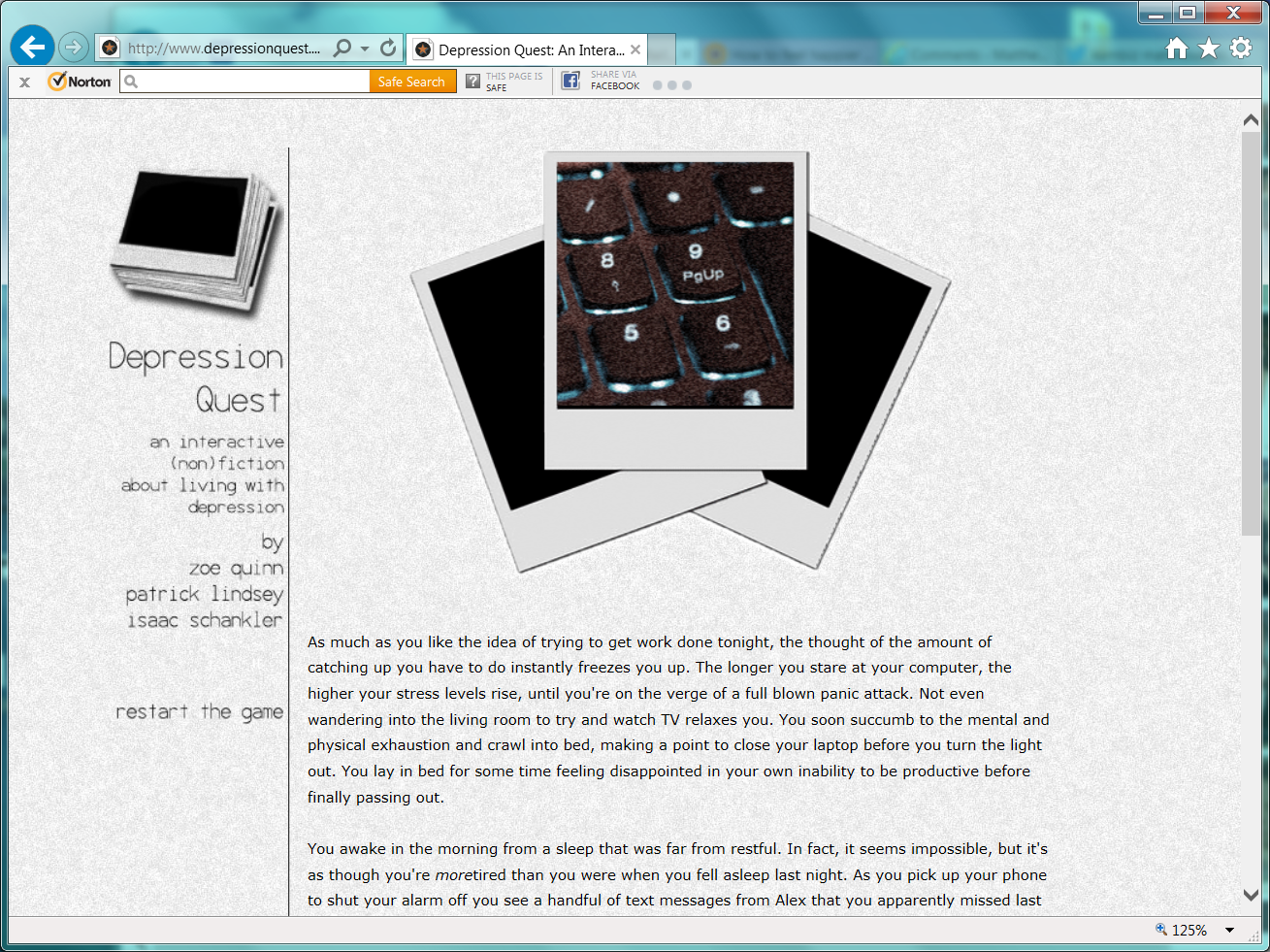
… nope. Remember kids. Take mental health advice from a qualified professional not a deeply mediocre ‘game’ developer.
The incident is not isolated. The whole game is just crass. At the bottom of the screen is a ‘status’ section, like the one out of a survival horror text game –

Are survival genre mechanics *really* appropriate here? Does her claim to have her own history of mental health problems *really* get Zoe Quinn off the hook?
Even the name, ‘Depression Quest’ is surprisingly crass for someone who claims to have experienced depression. Mental illness cannot be slain by a magic sword, Quinn. So, 6 for Gameplay. It is not bugged but it *is* moronically crass and ignorant.
The game also emphasises a patriarchal, paternalistic approach to mental illness with its emphasis on medication and therapy. Why have this obnoxious woman and her friends Patrick Lindsey and Isaac Schankler obtained such grovelling press? The game is the equivalent, for mental illness, of putting on blackface in a racial context.
The answer is that Zoe Quinn has somehow become a minor celebrity. The issue is not a bad, or patronising game. It is about women in gaming. Quinn has somehow become vaguely associated with characters like Anita Sarkeesian a ‘media critic’ who has inched her way onto the z-list thanks to a YouTube channel called Feminist Frequency. The essence of Feminist Frequency is that female characters in video games are often stereotyped and hyper-sexualised. This is of course true. So are the men. Video games are full of pneumatic women and Arnold Schwarzenegger type males.
Men have been concerned about body image for just as long as women, and as insecure. For exhibit A, your author presents a 1949 Charles Atlas advert –
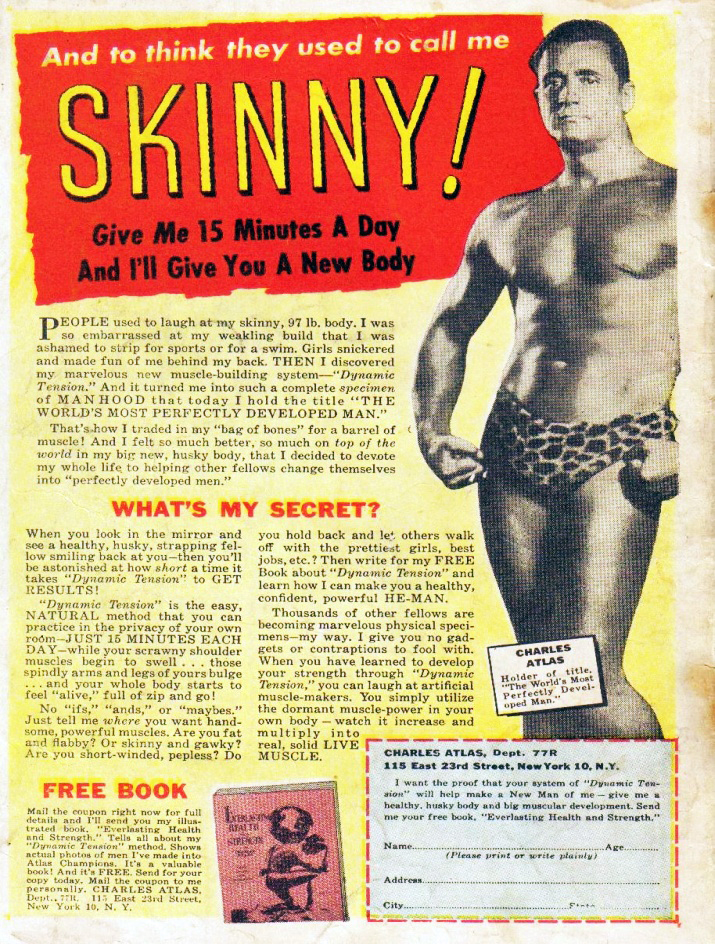
1949 Charles Atlas ad. Public domain, thanks to Wikipedia. Inspiration via the wonderful @LouiseMensch, who posted another Atlas ad in a twitter discussion.
The reality of life is that people like to look at physically healthy and attractive men and women, wherefore Hollywood and other media provide them. As the media can afford to always select the best specimens most people will not measure up. Anyone who says that only women feel a pressure to achieve a certain look simply needs to glance at Men’s Health magazine.
Charles Atlas and Men’s Health have made good money out of male concern over body image.
Where the Witchfinder differs from leftists is he thinks that is a good thing. Why not exercise, get more health, feel better, look better? As an alternative to say, whining about how everyone is thinner and better looking. A few years ago the Witchfinder followed a Men’s Health exercise programme and lost a lot of weight. He has put some of it back on and you know what? Your author intends to do another exercise programme instead of suing exercise magazines for creating a hostile environment.
The Witchfinder (a Conservative) thinks the answer to the issue is exercise. Zoe and Anita on the other hand, like most leftists, imply that the answer is speech control. This is, of course, an impossibility in a state with a First Amendment that even protects hardcore pornography and pictures of religious icons in urine. The correct approach to Zoe and Anita is to ignore them or mock their cookie-cutter left wing views.
Unfortunately some sad insecure types have gone beyond legitimate criticism and taken to threatening to murder and rape them. This is doubly unfortunate. First, death and rape threats against anyone online are abhorrent – your Inquisitor condemns them. Secondly, sympathy for the online verbal harassment has obscured Quinn’s very real flaws, the weakness of her arguments and her own risibly offensive conduct in the sphere of equalities.
At the same time there have been factually incorrect allegations about Quinn’s relationships with game journalists. Again, these are irrelevant. The legitimate and fatal criticism is that Quinn’s history of mental health problems does not give her the right to be spokesperson for the 16.6% of the population. Her work is crass.
A more legitimate approach is a write in campaign seeking a boycott of the companies that advertise for her and support her. Recently campaigners succeeded in persuading Intel to withdraw adverts from Gamasutra.com (not linked to avoid increasing traffic). The Witchfinder is more than happy to assist in organising a more general boycott of the site.
Ease of Use / Glitches – 12 / 25
The game is mostly stable, having no serious bugs. On the other hand it has no outstanding or innovative ease of use features. One minor but persistent annoyance is the occasional freeze-pauses after a choice is clicked. The game seems to assume that transition will be quick so there is no AJAX wait animation. As a result, the game is very much in the mediocre category – 12.
Subtotal – 37 / 100
Adjustment -10
The reviewer’s adjustment is this site’s final comment. Depression Quest is a mediocre free indie game (we say ‘free’ as payment is optional, though the author does seek donations). Ultimately its only selling point or redeeming feature is in its ‘education’ and ‘raising awareness’ of depression. It does so poorly in a condescending, stereotyping, author-centric, clumsy way. This game fails on its central goal and is fundamentally no fun in any other way. Minus 10.
Final Score – 27 / 100
A sledgehammer-over-the-head treatment of the sensitive topic of mental ill health. Does not justify death threats or harassment. Does justify criticism, mockery and boycott.
Boycott Campaign
If you feel offended by Anita Sarkeesian (@FemFreq) or by Zoe Quinn (@TheQuinnspiracy) then a polite campaign to persuade media outlets that their work is offensive is your lawful right. Gamasutra is owned by a company called http://www.ubm.com and the Corporate Chief Executive Tim Cobbold. The Witchfinder suggests a polite mass email campaign or snail mail letter to the address below.
**********************************************************************
Subject – Gamasutra Boycott Campaign
Dear Mr Cobbold,
We would like to write and express our concerns about the activities of a division of UBM, Gamasutra.com . We believe this property falls under UBM Tech. Gamasutra has recently, like many gaming sites, given prominent and sympathetic treatment to a game called Depression Quest and its author Zoe Quinn.
We understand the reasons for doing so. Superficially, the game does intend to raise awareness about mental health. Ms Quinn has indeed been subject to threats by less pleasant members of the online community and we, like all reasonable people, condemn such activity.
However, despite Gamasutra’s undoubted good intentions we feel that Depression Quest is a clumsy and superficial, condescending treatment of mental health. The game has been described as ‘equivalent to blackface’ by matthewhopkinsnews.com. We consider it offensive. In the past the wrongful misogynist threats a small minority have directed at Ms Quinn have obscured the problems with the game, which is fundamentally a poor to mediocre interactive fiction.
We ask you to direct that Gamasutra cease supporting Ms Quinn and her ideological comrades and whilst we hope you will be persuaded by reason, we are committed to exercising our 1st Amendment (in the US) and Article 10 ECHR (in the UK) rights by organising a boycott or even lawful, peaceful pickets of UBM offices if necessary.
Kind regards,
[Name]
**********************************************************************
Tim Cobbold,
Chief Executive
UBM plc
Ludgate House
245 Blackfriars Road
London
SE1 9UY
United Kingdom
and
Tim Cobbold,
Chief Executive
UBM, Inc
240 West 35th Street
New York
NY 10001
USA
Update 03/02/2015 18:30
Zoe Quinn has changed her screen name on her Twitter @TheQuinnspiracy to ‘found witch’. A response to the Witchfinder’s interest?

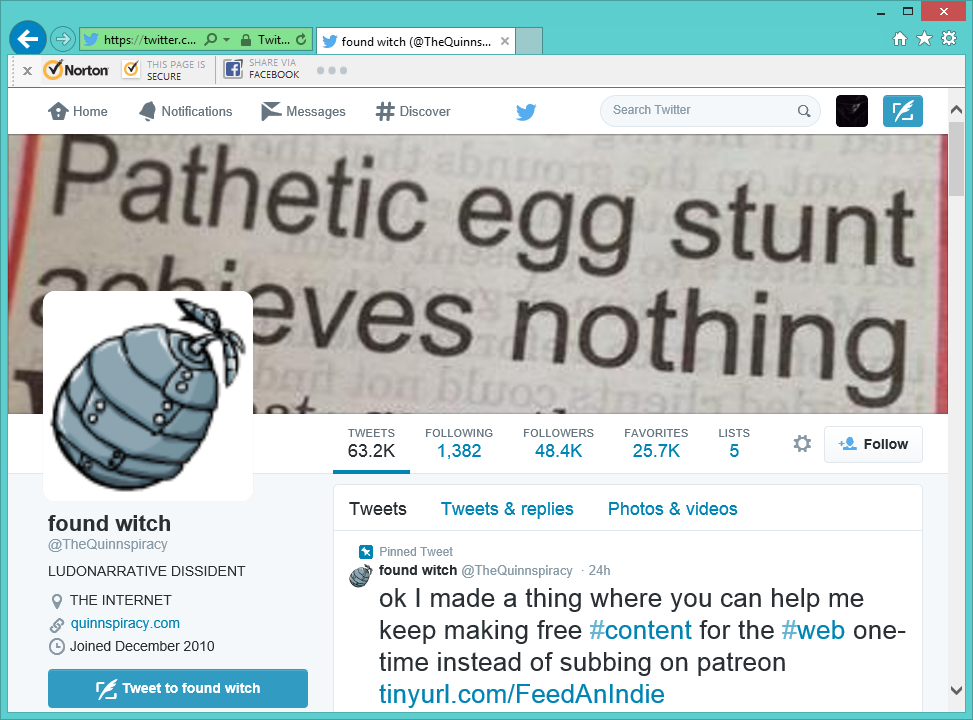

A fair review of the game. I like how you point out that it fails as representation of depression and is a bad analog for what it is like to suffer from this mental health issue.